- Home
- Nick Carter
Night of the Warheads Page 6
Night of the Warheads Read online
Page 6
The fact that he had married the daughter of another wealthy Basque exile, Don Ramon de Leon, also did not hurt his financial position.
Luis's wife, Maria, was as rabidly anti-France and pro-Basque as her husband, but there was no record of her becoming a guerrilla fighter like Luis.
Quite the opposite, in fact.
She lived in splendid sumptuousness in a huge villa near the beautiful old town of Carcassonne and raised her daughter to be a lady.
It could be assumed that between Maria and her old grandfather, Don Pepe, Armanda's education had been liberally spiced with grand tales of her often absent father's patriotic deeds and the Basque «right» to a separatist homeland from Spain.
Old Don Pepe died when Armanda was twelve. Luis couldn't attend his father's funeral. He was in jail in Barcelona for leading four other Basques in a bank robbery to gain "funds of liberation."
Four years later, Luis would be dead, killed in an attempt to escape.
Between 1963 and 1969, when Armanda reached the age of eighteen, little was heard from mother or daughter.
Then, in June of 1969, Armanda married Pierre du Cort, a man forty years her senior.
The marriage lasted a year. Du Cort was killed in an auto accident on the Amalfi Drive in Italy.
He left Armanda a very wealthy widow.
For the next two years, mother and daughter petitioned Franco to allow them to return to Spain.
The answer was always no.
In retaliation Armanda toured Europe, proselytizing against the Fascist dictator by day, and having liaisons with rich and influential men by night.
Shortly after Franco's death in 1975, the beautiful socialite married again, this time to a rich German industrialist.
Alas, this marriage also had a sad ending for the groom. He died in an airplane crash near Innsbruck.
King Juan Carlos lifted Franco's exile on the de Nerros, but Maria loudly proclaimed to all who would listen, "…I will never return to the land of my fathers until it is free of Spanish tyranny!"
Evidently, Armanda agreed with her mother. The twice-widowed beauty was now fabulously wealthy. She traveled in the jettest of jet sets and used her associations to increase her wealth.
She gained a reputation as a complex woman, with deep-seated convictions about her Basque heritage as well as a seeming thirst for life in the fast lane with the very kinky and very rich of the world.
In 1979 Armanda dropped out of sight for two years. She surfaced again in 1981, in Italy. Shortly afterward, she was arrested.
Lupe de Varga was the Basque equivalent of the Palestinian terrorist and assassin, Carlos the Jackal. Acting as the Basque liaison to Italy's Red Brigade, de Varga was one of the prime movers and planners in a plot to kidnap a Swiss multimillionaire for ransom. Once the plan was carried out, the Basque separatist movement and the Red Brigade would split the proceeds to help finance further terrorist activities in their respective countries.
Before the plot could be consummated, it was uncovered. De Varga and five of his Red Brigade brothers were caught in a San Remo villa. Rather than surrender, they opted for a shoot-out with the Italian authorities.
Ail of them were shot and burned to cinders in one wing of the villa. Armanda de Nerro was also in the villa. She was captured and indicted in the Italian courts for terrorist activity.
Besides being the registered owner of the villa, Armanda was rumored to have been de Varga's mistress. Because this was only rumor, and because she pleaded her innocence on the grounds that she had been kidnapped — and considering her wealth, that made sense — held against her will for months, and forced to participate, she was eventually exonerated.
Her striking beauty did not hurt her cause in an Italian courtroom, and neither did a parade of her former wealthy and influential lovers when they came forward as character witnesses.
Once her freedom was assured, de Nerro resumed her jet-setting ways on the Continent. Interpol kept track of her for a while, suspecting her continued liaison with terrorists in general and the Basque Euzkadi Ta Askatasuna in particular. When they could get nothing concrete they dropped the surveillance.
It was about then, fourteen months before, that the lady packed up, bag and baggage, and moved to Andorra with her by now aging but still active mother.
Carter closed the folder and eyeballed the steward for a fresh drink. When it came he lit a cigarette and sipped the scotch reflectively.
Armanda de Nerro was quite a woman indeed. She obviously had as much intelligence as beauty, and she had used those assets to garner a great deal of wealth and friends with influence. Combine that with a fanatical belief in a revolutionary cause like ETA, and you just might have a woman who was as deadly as she was beautiful.
But, Carter mused, was Armanda de Nerro that devoted to the Basque cause? Or were the events of her life mere accidents that made it look that way? Was her relationship with de Varga just rumor, as she claimed, or was she really his mistress and coconspirator?
Finding out would be one of Carter's main tasks.
He set aside the first folder and opened the second. It was marked Background and current status of EUZKADI TA ASKATASUNA (ETA) — Basque revolutionary movement to create a state free of Spain.
Carter already knew most of the folder's contents, but a few of the finer points were filled in as he read.
In the beginning, the Basques were the gudaris, the core strength of the Loyalist army who fought Franco. Even after the Spanish Civil War was over, the Basques took to the hills as guerrillas to fight Franco's Fascism.
Because of this they were aided and admired by a great many of the populace.
When Franco died, many thought the Basques would lay down their arms.
Nothing could have been farther from the truth. Less than twenty-four hours before democracy came to Spain under King Juan Carlos, the Basques struck against the new regime.
They executed the mayor of a small town in Guipuzcoa, an inspector of city buses, and a taxi cab driver. All were killed as "oppressors of the people."
To the Spanish people, the world at large, and their fellow Basques, this was nothing but random murder, a calling card that the new democratic government of Juan Carlos meant no more than the old Fascist regime of Franco.
In the years that followed, there were beatings, abductions, bank robberies, and extortion in the name of the Revolutionary Tax to fund the ETA terrorist movement.
By the late 1970s, ETA had declared itself a Marxist-Leninist movement. It was now dedicated to the dictatorship of the proletariat, and terrorism was the means to that end.
The leaders of ETA were no longer simply interested in Basque separatism. Their goal was continent-wide insurrection and an eventual Communist Spain.
Carter closed the folder and sighed audibly enough to turn a few heads nearby.
What better way to hold an entire country for ransom, he thought, than to threaten its government with eight missiles bearing nuclear warheads?
* * *
Carter was the last one off the plane and the first one out of the airport while the press plagued the VIPs.
He cabbed into Paris and, out of habit, changed taxis three more times before arriving at a small pension on the Left Bank.
After checking in under a cover name, he showered, shaved, and wolfed down breakfast at a nearby café.
By then it was nearly noon, the contact time Hawk had given him.
"Monsieur Pallmar, please."
The SDECE man was on the line in seconds.
"Out. Pallmar."
"Monsieur Pallmar, the Vice-President's plane has landed."
"Where are you?"
"At a small café near the Pont Neuf, on the Left Bank."
"Good. Go to the St. Michel Metro station…"
"I know it," Carter replied.
"Get off at the Gare du Nord. There is a newsstand at the top of the Metro ramp. Ask for a copy of Baumpierre's Revolution Today."
"And w
ill he have it?"
"No, but I will recognize you. Walk up the Rue de Maubeuge, cross the Boulevard de la Chapelle, and go up Rue Stephenson toward St. Bernard. I will overtake you just short of a tiny alleyway and make contact. Follow me from there."
"Will do."
Carter left the café, walked the few blocks along the Seine to the Place St. Michel, and went into the Metro station. He bought a ticket and boarded the swift, silent Metro train.
At the Gare du Nord — a huge railroad station — he quickly spotted the newsstand. He perused the paperback racks for a few minutes and then made his request in French.
"Non, je regrette, monsieur. I do not have it."
"Merci," Carter said and walked outside. On Rue Stephenson he slowed his pace, pausing now and then to gaze into a shop window.
He was three blocks short of the little church of St. Bernard when a small, gray-haired man in a beret and English tweeds passed near his shoulder.
"Follow me at a short distance, Monsieur Carter."
The whisper came with barely a pause in the little man's step. Carter moved along about ten paces behind him. When the man turned into a narrow alley, Carter followed.
Fifty yards into the alley, the man stepped through a small wooden door. When Carter reached it, the door had been left partially ajar. Carter took one quick look over his shoulder and stepped through into a small courtyard.
The door closed behind him with a click, and Carter turned to see a smiling Andre Pallmar extending his hand.
"Sorry to make it so difficult, Monsieur Carter, but it would never do if we were seen talking in public."
"I understand."
"And in light of your superior's request. I hardly think it would be wise if you were seen at our offices."
"Hardly."
"If you will follow me, please?"
The house had three stories, the bottom two empty. The third was a series of three bedrooms, all comfortably furnished.
"Make yourself comfortable. A glass of wine?"
"Brandy, if you have it."
"Certainly."
Minutes later, the two men were settled in, drinks in hand, facing each other over a low coffee table.
"Here are the documents you will need to establish your identity as Nicholas Carstocus."
Carter examined them and smiled his appreciation at the other man. "Very thorough."
"Thank you. Needless to say, we have kept his accounts in perfect order. You may even use his credit cards. Here are several copies of his signature. I assume you have the ability, after some practice, to duplicate it perfectly?"
Carter nodded. "A small part of my training."
"Excellent. You have a photo for the passport?"
Carter produced an envelope from his inside pocket and from it a passport photo.
Pallmar took the necessary stamps, glue, and sealant from his own pockets, and two minutes later Carter's picture was on the document.
"There we are. perfect authenticity."
"I thank you. Monsieur Pallmar. And the villa?"
"Taken care of, as well as a Spanish contact in Andorra."
Again the well-manicured little hand went into the man's bottomless pockets.
"Her name is Louisa Juaneda. Vital statistics, background, and everything else you should know are on the back of the photo. Memorize it, please, and return the photo."
Carter took in the woman in one thorough glance. It was a glamour-style composite color photo showing her in several full-length poses, with a facial close-up in the center.
Most of the full-length photos had been taken in floor-length, second-skin sequined gowns. Louisa Juaneda had lots of full-figured curves in all the right places. The close-up head shot displayed a brunette with hair so black it was almost blue, and glinting brown eyes that said, "Catch me… if you can!"
"Entertainer?" Carter asked.
Pallmar nodded, letting smoke stream through his nostrils from a Gauloise. "Singer. She has been working the hotel lounges in Andorra for about six months."
Carter flipped the photo and scanned the back. It was impressive. Louisa Juaneda had been working undercover for both the French and the Juan Carlos governments for almost five years, and very effectively.
Then Carter's eyes lit on her personal background, and his head jerked back up to face Pallmar.
"Basque?"
"Yes, but far from the ETA," the other man replied. "Her whole family has been financially ruined in the north of Spain because of the ETA terrorist tactics. Her father was almost killed in an ETA bombing. He lives in Madrid now, a cripple. I assure you, Monsieur Carter, she is good and can be trusted."
"Good enough for me," Carter said, passing the photo over and leaning back on the couch. "Now, how do we go about leaking me as Bluebeard?"
The cloud that passed over Pallmar's eyes hit Carter hard with its intensity. The man leaned forward and used far too much vehemence in crushing out his cigarette before he spoke at last.
"I am sure your superior has told you that we have kept Nicholas Carstocus alive — at least on paper — in the hope of netting some of his clients, or even would-be clients."
Carter nodded and shielded the frown on his own face by lighting another cigarette of his own.
"Well, it would seem that our Mr. Carstocus entered into a contract just before we uncovered him…"
"And he met his untimely end."
"Yes, a mistake that, overzealousness on the part of one of our best men. But nevertheless, Carstocus was paid a very handsome sum, probably as a down payment on a contract."
Carter sighed. "And now the people want some action, or their money back."
"Quite. We have stalled them for almost a month. We were about to close the whole thing out and publicly declare Carstocus dead, when this request of yours came from Washington. Needless to say, it would be a way for you to establish yourself as Bluebeard."
"How much was the advance?" Carter asked.
"One hundred thousand dollars, deposited in Carstocus's Swiss account."
"Where you can't get your hands on it."
The narrow shoulders shrugged in the inimitable French way. "We control his French and American accounts, but, as you say… the Swiss… ah!"
Carter stood, stretched, and began to pace.
"So if I check out the contract and agree to keep pursuing it, I might be able to hold them off long enough to get my business in Andorra done."
"Precisely," Pallmar said.
"And if I don't and if we leak Carstocus as Bluebeard, I'll have them all over my ass once I'm in Andorra."
"Equally precise."
"Monsieur Pallmar, I do believe I'm somewhere between the proverbial rock and a hard place."
"A quaint American expression, Monsieur Carter, but very apt."
"Where's the contact?" Carter asked, folding his tall, catlike body back into the couch.
"Marseille," Pallmar replied, pulling a set of papers and a copy of the International Herald Tribune from his coat. "The name in the ad is Pepe…"
Six
Carter left Paris by car on a Wednesday afternoon. Before leaving, he placed the answering ad in both the Tribune and La Voix, one of the smaller Marseille dailies.
Pepe: Prudence has caused me to take so long in replying. Say «yes» Friday, and check for number Saturday. Monsieur B.
He drove leisurely on the A6 to Lyon, where he spent the night, and even more slowly the next day, arriving in Avignon at around three in the afternoon.
After dumping the rented car, he cabbed to the train station, where he shipped both his bags on to Marseille in the Carstocus name.
From there he walked the few blocks to the town's old shopping quarter. From different outside stalls he made purchases of a pea jacket, two denim shirts, two pairs of faded denim trousers, a denim jacket, a pair of boots, and a heavy black turtleneck sweater.
In a surplus store he bought a duffel bag and tipped the acne-scarred young clerk to use the rest roo
m.
Five minutes later he emerged a tramp seaman.
"We have razors, monsieur," the clerk said, eyeing Carter's two-day growth.
"No need," Carter growled in a low French dialect. "I'm back to sea in two days."
Carter left the shop and checked into the cheapest hotel he could find in the roughest part of town.
"Twenty francs, monsieur, in advance."
"Does that include a lock on the door?"
"But of course."
It did, but it didn't work. It took Carter twenty minutes to fix it, even though he knew someone could break it again in a minute if he wanted in badly enough.
Hugo — his deadly stiletto — Carter left strapped to his right calf encased in its chamois sheath. Wilhelmina and two spare clips of shells were secured under a pair of loose floorboards.
Then he stretched out on the rickety bed and, in minutes, was fast asleep.
At ten sharp his mental alarm went off. Instantly alert, he crawled from the bed and dressed in the turtleneck and denim trousers. He pulled the light denim jacket over the turtleneck and went down to the street.
The night was alive with neon and laughter from the open sidewalk cafés. On a hill dominating the city, Carter could see the Palais des Papes, the Palace of the Popes. Near it were other palaces that had been converted into modern hotels. It was there, and across the river in more expensive Villeneuve, where most of the well-heeled tourists would currently be dining and would shortly be looking for the evening's entertainment.
That, thought Carter, looking around, was exactly where he did not want to be.
The six-block stretch of street in front of him was perfect for the evening's hunting. It was full of garish bistros, cheap hotels — some for all-night guests, others that charged by the hour — and three or four nightclubs with hard-looking doormen-cum-bouncers lounging in front of their doors.
Carter moved down the street until he spotted a café that appeared a little cleaner than the rest, and stopped. He chose a table near the sidewalk, and waved to a dour-looking waiter who sported a Gauloise hanging from the side of his mouth and a dirty apron wrapped twice around his middle.
He staggered over.

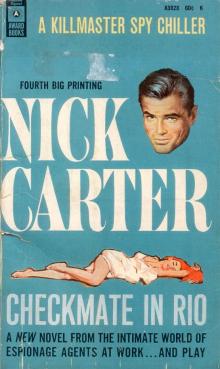 Checkmate in Rio
Checkmate in Rio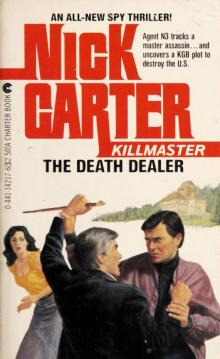 The Death Dealer
The Death Dealer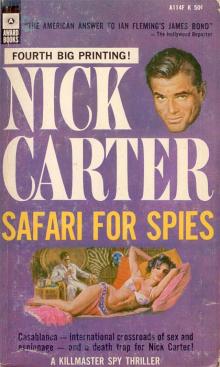 Safari for Spies
Safari for Spies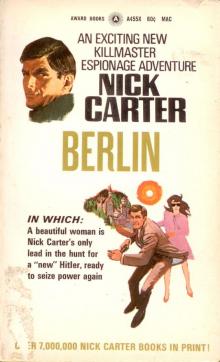 Berlin
Berlin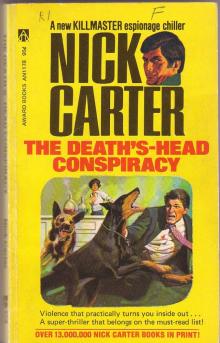 The Death’s Head Conspiracy
The Death’s Head Conspiracy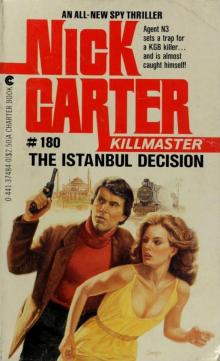 The Istanbul Decision
The Istanbul Decision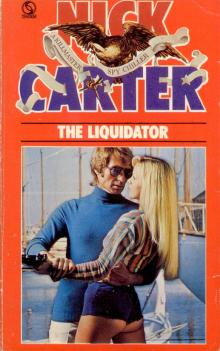 The Liquidator
The Liquidator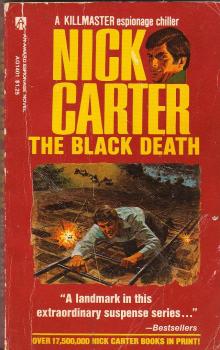 The Black Death
The Black Death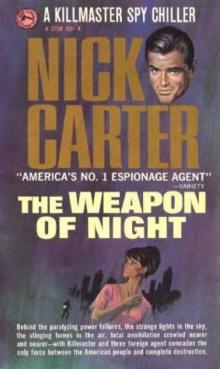 The Weapon of Night
The Weapon of Night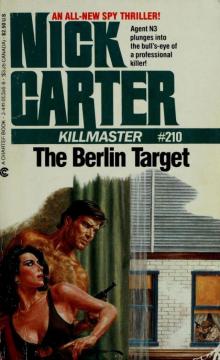 The Berlin Target
The Berlin Target Temple of Fear
Temple of Fear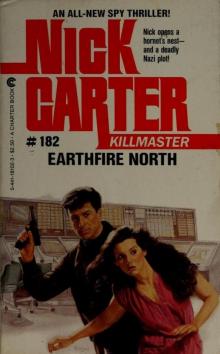 Earthfire North
Earthfire North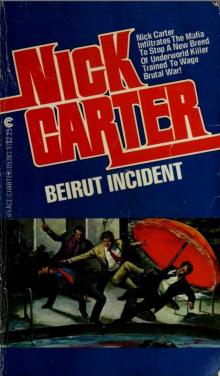 Beirut Incident
Beirut Incident White Death
White Death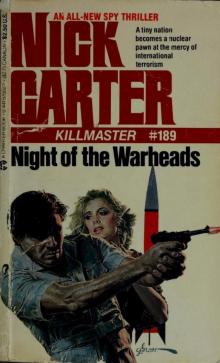 Night of the Warheads
Night of the Warheads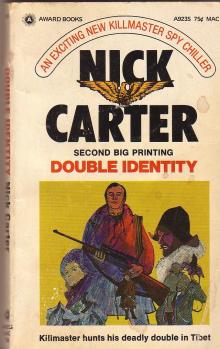 Double Identity
Double Identity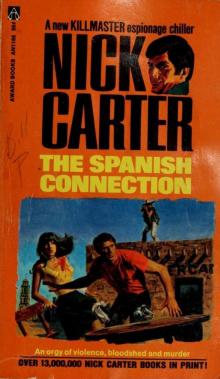 The Spanish Connection
The Spanish Connection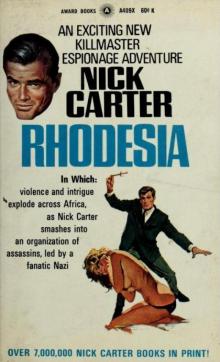 Rhodesia
Rhodesia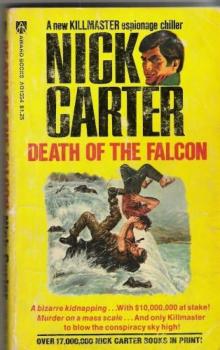 Death of the Falcon
Death of the Falcon The Executioners
The Executioners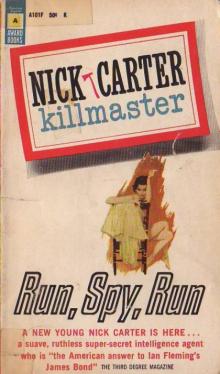 Run, Spy, Run
Run, Spy, Run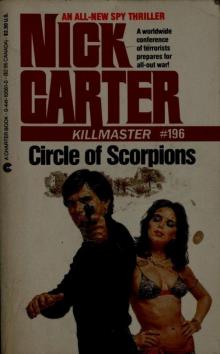 Circle of Scorpions
Circle of Scorpions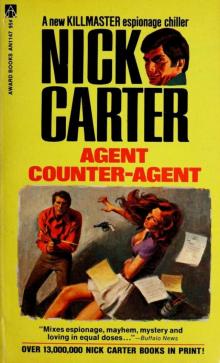 Agent Counter-Agent
Agent Counter-Agent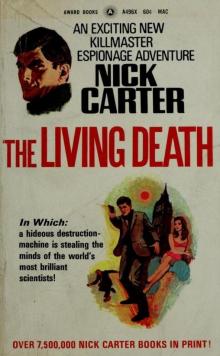 The Living Death
The Living Death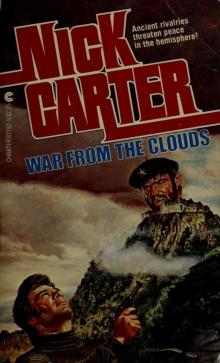 War From The Clouds
War From The Clouds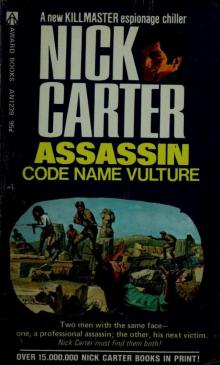 Assassin: Code Name Vulture
Assassin: Code Name Vulture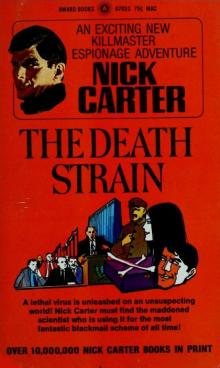 The Death Strain
The Death Strain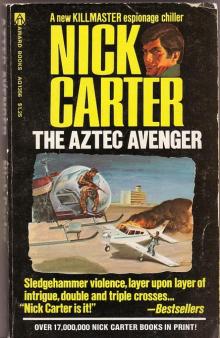 The Aztec Avenger
The Aztec Avenger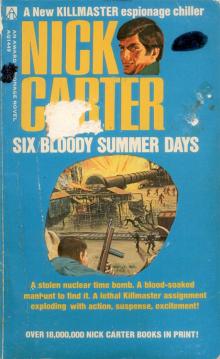 Six Bloody Summer Days
Six Bloody Summer Days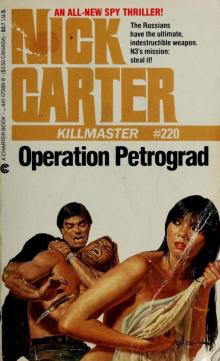 Operation Petrograd
Operation Petrograd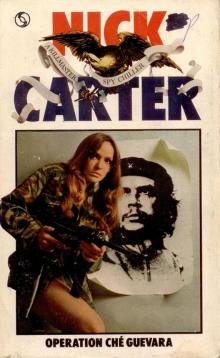 Operation Che Guevara
Operation Che Guevara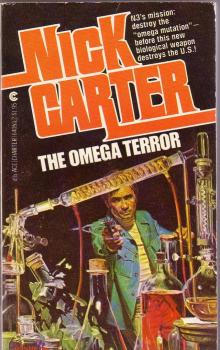 The Omega Terror
The Omega Terror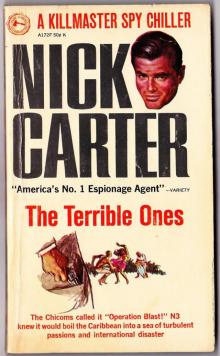 The Terrible Ones
The Terrible Ones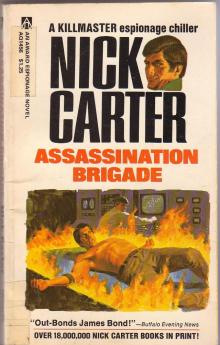 Assassination Brigade
Assassination Brigade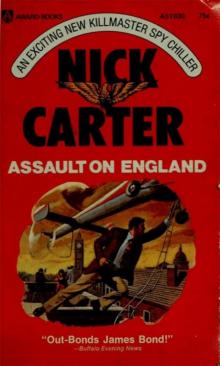 Assault on England
Assault on England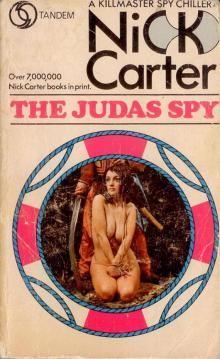 The Judas Spy
The Judas Spy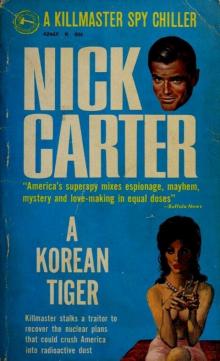 A Korean Tiger
A Korean Tiger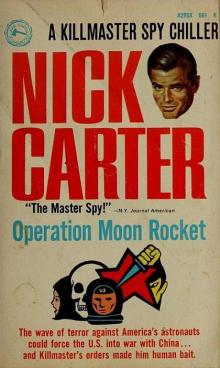 Operation Moon Rocket
Operation Moon Rocket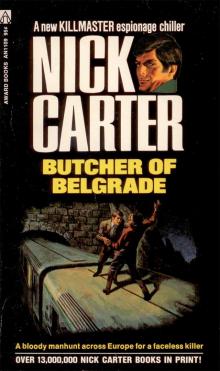 Butcher of Belgrade
Butcher of Belgrade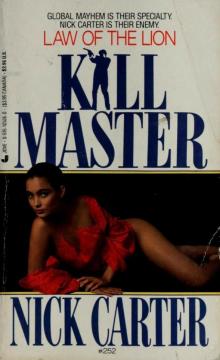 Law of the Lion
Law of the Lion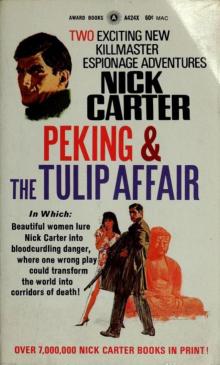 Peking & The Tulip Affair
Peking & The Tulip Affair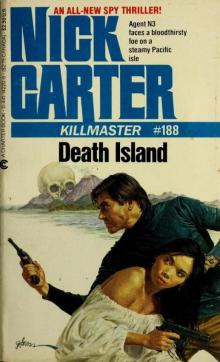 Death Island
Death Island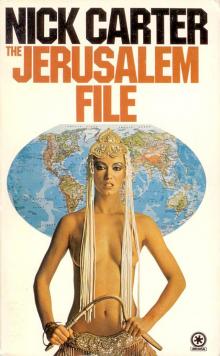 The Jerusalem File
The Jerusalem File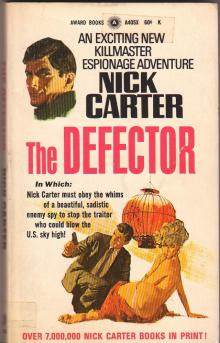 The Defector
The Defector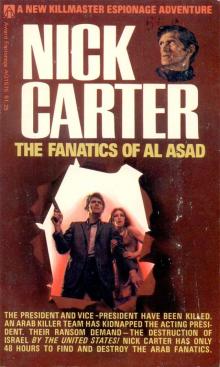 The Fanatics of Al Asad
The Fanatics of Al Asad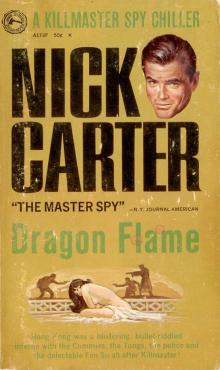 Dragon Flame
Dragon Flame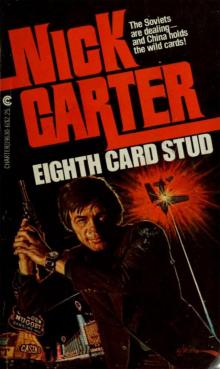 Eighth Card Stud
Eighth Card Stud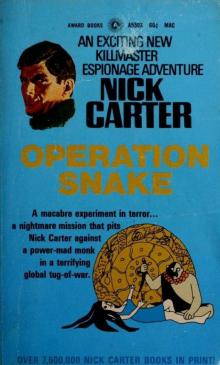 Operation Snake
Operation Snake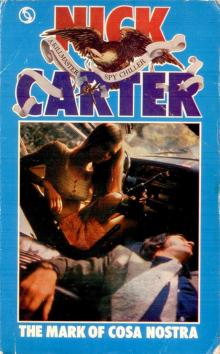 The Mark of Cosa Nostra
The Mark of Cosa Nostra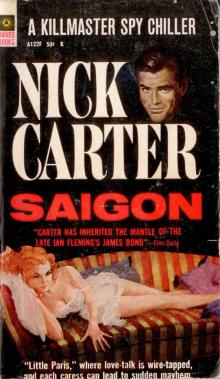 Saigon
Saigon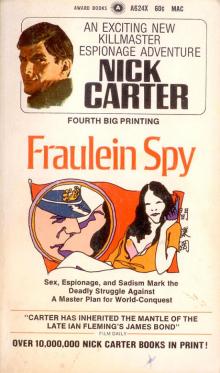 Fraulein Spy
Fraulein Spy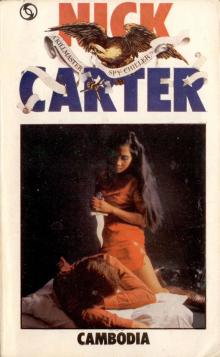 Cambodia
Cambodia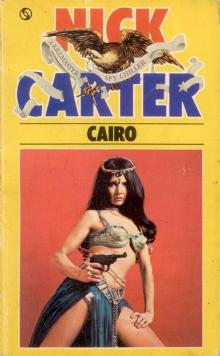 Cairo
Cairo